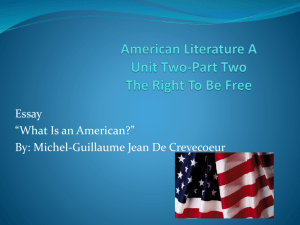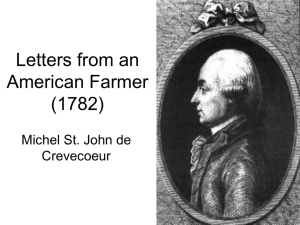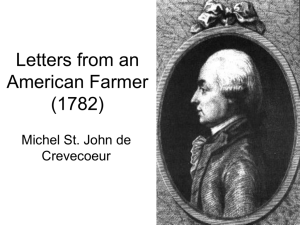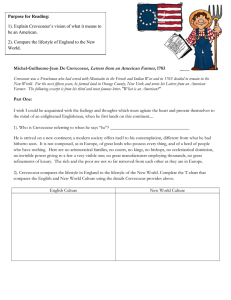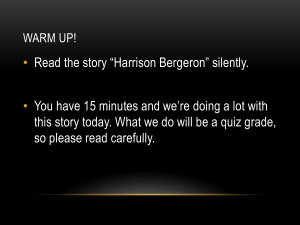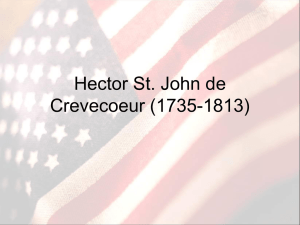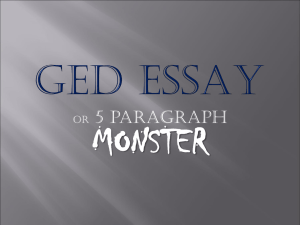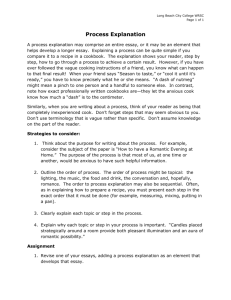Crevecouer Essay Focus: Writing Strong Opening Paragraphs in AP
advertisement
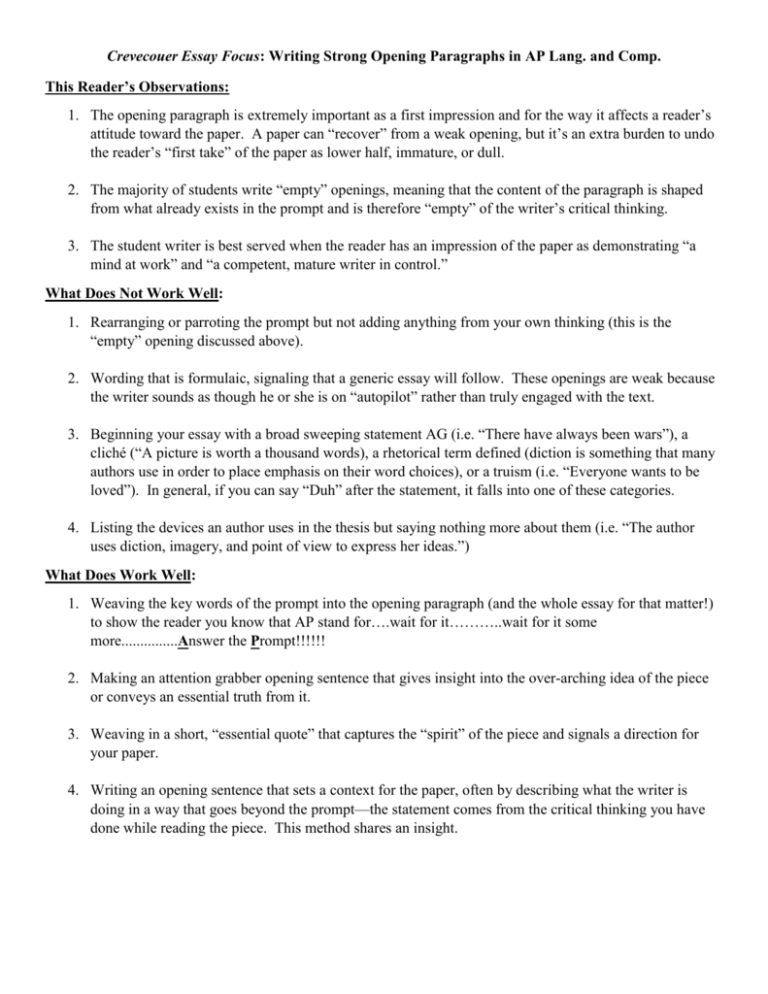
Crevecouer Essay Focus: Writing Strong Opening Paragraphs in AP Lang. and Comp. This Reader’s Observations: 1. The opening paragraph is extremely important as a first impression and for the way it affects a reader’s attitude toward the paper. A paper can “recover” from a weak opening, but it’s an extra burden to undo the reader’s “first take” of the paper as lower half, immature, or dull. 2. The majority of students write “empty” openings, meaning that the content of the paragraph is shaped from what already exists in the prompt and is therefore “empty” of the writer’s critical thinking. 3. The student writer is best served when the reader has an impression of the paper as demonstrating “a mind at work” and “a competent, mature writer in control.” What Does Not Work Well: 1. Rearranging or parroting the prompt but not adding anything from your own thinking (this is the “empty” opening discussed above). 2. Wording that is formulaic, signaling that a generic essay will follow. These openings are weak because the writer sounds as though he or she is on “autopilot” rather than truly engaged with the text. 3. Beginning your essay with a broad sweeping statement AG (i.e. “There have always been wars”), a cliché (“A picture is worth a thousand words), a rhetorical term defined (diction is something that many authors use in order to place emphasis on their word choices), or a truism (i.e. “Everyone wants to be loved”). In general, if you can say “Duh” after the statement, it falls into one of these categories. 4. Listing the devices an author uses in the thesis but saying nothing more about them (i.e. “The author uses diction, imagery, and point of view to express her ideas.”) What Does Work Well: 1. Weaving the key words of the prompt into the opening paragraph (and the whole essay for that matter!) to show the reader you know that AP stand for….wait for it………..wait for it some more...............Answer the Prompt!!!!!! 2. Making an attention grabber opening sentence that gives insight into the over-arching idea of the piece or conveys an essential truth from it. 3. Weaving in a short, “essential quote” that captures the “spirit” of the piece and signals a direction for your paper. 4. Writing an opening sentence that sets a context for the paper, often by describing what the writer is doing in a way that goes beyond the prompt—the statement comes from the critical thinking you have done while reading the piece. This method shares an insight. Crevecoeur High Scoring Prose Analysis Essay (Q2): Directions: Read the essay, highlighting/underlining what you believe this writer does well. Many foreigners came to America during the republic’s formative years to explore the life in the new nation. The writings of de Tocqueville and Charles Dickens commented on the new American character and government in the nineteenth century. Michel-Guillaume-Jean de Crevecoeur, who wrote Letters from an American Farmer in 1782, was not alone in his endeavor, though he was one of the first to visit the new United States. His writing generally reflects a positive image of Americans. While taking note of their humble origins and lack of cultural refinement, he praises the resilience of American citizens. Crevecoeur's diction, and the positive connotations of the words he uses to describe Americans present his positive, though occasionally paternal and superior, attitude toward Americans and disparaging discernment of Europeans. Americans are defined by Crevecoeur largely in terms of the land they left—Europe. Their new nation is a haven from a Europe of "severe laws, with jails and punishments." The common folk in England are faced by the "frowns of the rich." The new Americans have left the "refinement" of Europe behind, along with the class system and much else which had restricted them. These images tell us as much about Crevecoeur’s attitude toward Europeans as it does towards Americans. The negativity attached to Americans' background perhaps emphasizes their ultimate determination and drive once they arrived on new soil. Crevecoeur deliberately uses negative phrases in describing Americans pasts in Europe so that their change in new country will be even more dramatic. Crevecoeur emphasizes the newness of the United States, as opposed to Europe, thus implying a positive impression of the land. In his opening sentence, Crevecoeur refers to America as an “asylum” whom “the poor of Europe have by some means met together”; a refuge suitable only for the wretches of sophisticated European life. While this seems to refer to Americans in a negative light, he leaves no doubt about the successful attainment of such a goal, lauding it by writing that the "surprising metamorphosis" from wretches to citizen is thanks to American "laws and ... Industry." While he may look down somewhat on the breeding and manners of the Americans, noting that they come from the lower rungs of European social hierarchy, he certainly believes the new land is good for them. America is a place of “regenerative" powers, with "new laws, a new mode of living, a new social system." Crevecoeur credits America with encouraging the “flourishing" of the world’s poor and unwanted. Although Crevecoeur generally presents Americans in laudable terms, a trace of condescension appears in some phrases. America was made up of "wretches" who had previously "wondered about." They had endured lives of "sore affliction or pinching penury." But despite the seeming elitism of Crevecoeur’s description his word choices elicit sympathy rather than scorn in the attentive reader because he is referring to the Americans previous lives in Europe. Crevecoeur makes a careful point of the work ethic of these derelict new countrymen, essentially homeless among the world’s nations. Such attention clearly shows that Crevecoeur is sensitive to the plight if the new Americans Crevecoeur writes as if America has surpassed his expectations as a melting pot of undesirables. He has an optimistic view of the country's role in the future. Compared to crusaders, the Americans he praises are the “western pilgrims" full of the “great mass of arts, sciences, vigor, and industry" that once issued from the east. It is important to note that Crevecoeur ends his essay on a positive tone, with phrasing that emphasizes greatness. Here, in his conclusion, Crevecoeur’s attitude towards Americans is hopeful and enthusiastic. They are the nation if the future he believes, and they will deeply influence the future of the world with their newborn splendor. Justification: Why is this a high scoring essay? Put it all together. Look at what you highlighted/underlined and articulate what this essay does well and how it does it.
